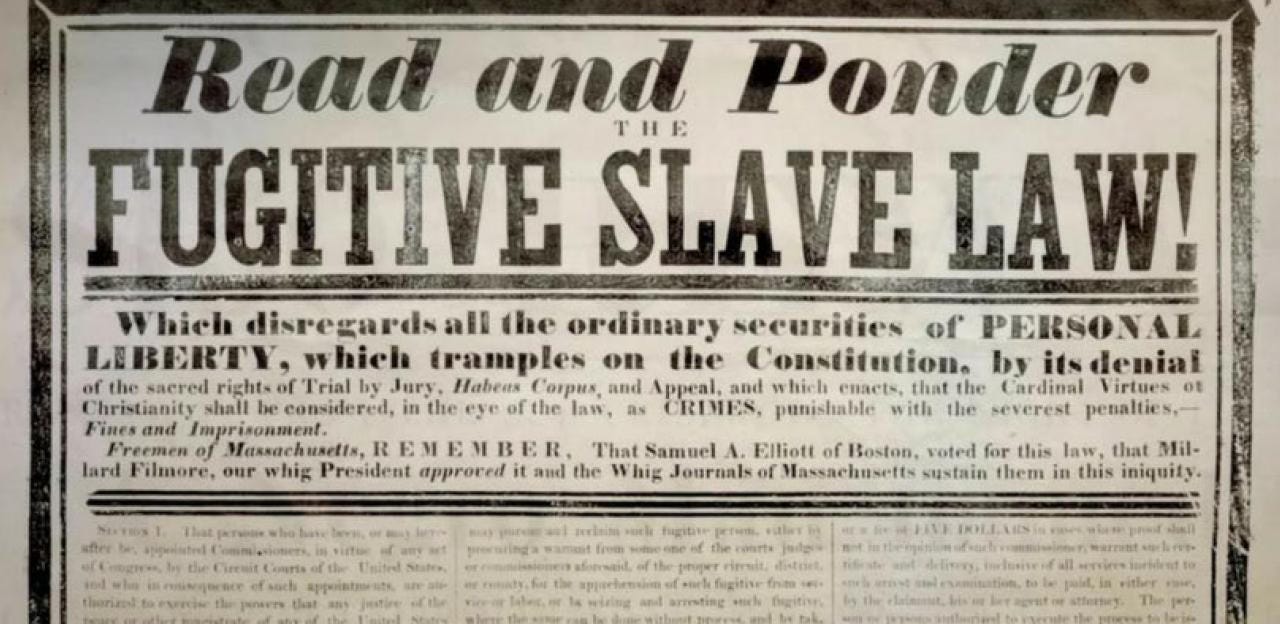This Day in Legal History: Fugitive Slave Act Signed
On September 18, 1850, U.S. President Millard Fillmore signed the Fugitive Slave Act into law, a key and highly controversial component of the Compromise of 1850 and a dark moment in American history – unfortunately, one among many in the 19th century. The Act required that escaped slaves, even if they had reached free states, be captured and returned to their enslavers. It also imposed heavy penalties on anyone who aided a fugitive slave, including fines and imprisonment. Disturbingly, the law authorized federal marshals and local law enforcement to arrest individuals based on little more than a slaveholder's claim, placing free Black men and women at risk of being falsely accused and sold into slavery.
The Fugitive Slave Act enraged abolitionists and free states in the North, who viewed the law as a gross infringement on their legal sovereignty and moral principles. Northern citizens were now legally obligated to participate in the enforcement of slavery, a practice many detested. Conversely, slaveholders in the South celebrated the law as a victory, seeing it as essential for the preservation of their economic system.
This deepened the divide between North and South, escalating tensions that would eventually lead to the Civil War. The Act's passage not only exposed the fragility of compromises between pro-slavery and anti-slavery factions but also galvanized the abolitionist movement. It showed how far the federal government was willing to go to protect the institution of slavery, making resistance increasingly inevitable.
In a piece I wrote for Forbes, I weighed in to a tax policy proposed by former President Donald Trump. Floated by Trump at a rally in Arizona, the "No Tax on Overtime" policy aims to eliminate income tax on overtime pay, echoing a previous proposal to end taxes on tips. While the policy is presented as a way to relieve tax burdens on hourly workers, a closer analysis reveals several potential issues. By creating a tax-free incentive for overtime, the policy could favor workers able to put in extra hours, leaving others—like working parents—disadvantaged. This could deepen income inequality, as those unable to work overtime would continue paying taxes on their standard wages, while others benefit from a lighter tax burden.
Additionally, employers may shift compensation structures to push for longer working hours, leading to lower base wages and a culture of overwork. Implementation of the policy would also create administrative challenges for employers and the IRS. Instead of targeted tax breaks, broader reforms like increasing the federal minimum wage might better address wage inequities without distorting the labor market.
‘No Tax On Overtime’ Policy Would Be Even Worse Than ‘No Tax On Tips’
In the first 10 days of Kamala Harris’s presidential campaign, lawyers contributed more to her than they did to Donald Trump’s campaign over nearly two years, according to Federal Election Commission (FEC) data. Harris received nearly $8.3 million from around 26,000 contributions from individuals listing "attorney" or "lawyer" as their occupation after Joe Biden endorsed her in July 2024. In comparison, Trump’s campaign, which began in November 2022, raised about $6.88 million from lawyers over that entire period. Lawyers have historically favored Democratic candidates, with Harris’s and Biden’s campaigns together raising significantly more from the legal profession than Trump’s campaign. In previous elections, Democratic candidates like Barack Obama, Hillary Clinton, and Joe Biden have all received much more financial support from lawyers than their Republican counterparts. The data reflects a broader trend where large law firms and individual lawyers increasingly lean toward Democratic candidates.
Lawyers Give More to Harris in 10 Days Than Trump in Entire Race
Donald Trump recently pledged to restore the state and local tax (SALT) deduction, a tax break he limited during his presidency as part of the 2017 Tax Cuts and Jobs Act. In a post on Truth Social, Trump promised to reverse the $10,000 cap on SALT deductions, which has disproportionately impacted residents in high-tax areas like New York, especially in suburban areas where property values are high. The cap was initially supported by Republicans as it helped balance tax cuts elsewhere in the law. Senate Majority Leader Chuck Schumer criticized Trump’s reversal, pointing out that Trump himself had imposed the cap. Repealing the limit could add an estimated $1.2 trillion to the cost of extending the tax law. Trump's focus on this issue, particularly in Long Island, reflects the area’s significance in ongoing battles for control of the U.S. House of Representatives.
Trump Pledges to Restore SALT Write-Off, Tax Break He Curbed (1)
Yesterday, on September 17, 2024, California Governor Gavin Newsom signed two bills designed to protect actors and performers from unauthorized use of their digital likenesses by artificial intelligence. One bill mandates that contracts specify when AI-generated replicas of a performer's voice or image will be used, requiring the performer to have professional representation in contract negotiations. The other bill prohibits the commercial use of digital replicas of deceased performers without consent from their estates. These laws respond to growing concerns in the entertainment industry about AI’s potential to exploit performers’ likenesses without permission, part of broader fears about AI’s ethical and legal implications.
California governor signs legislation to protect entertainers from AI | Reuters













